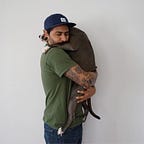La Habana Vieja (The Old Havana)
I
“Mexicano?” The bicitaxi operator asks me.
This was probably the fifth time in 3 days I had been asked if I was Mexican, by a bicycle or car taxi operator. After the first couple times, I found it was easier to say that my parents were from El Salvador but I was born in the United States. My brown skin and apparent Mexican accent in Spanish doesn’t exactly fit the narrative of what Cuban citizens seem to think being an American is — something I don’t hold against them since my country has yet to figure it out for themselves.
“Ah okay. Americano! My fren,” he says. Everyone is your friend in Cuba.
As Martin peddles us through heavy rains that only seem to come in hour-long bouts about twice a day, we talk about Japanese food, his favorite football club (Barcelona), and why it is that Che Guevara, not Fidel Castro, is a more prevalent figure in art and imagery in Cuba. “Well, you have to realize that Che has been dead for more than 50 years. Fidel, who passed only 2 years ago, did not want the art, memorials, monuments, etc. The Cuban people have respected his wishes so far.” As he turns his head and lowers his gaze, he says to me in a hushed voice, “to be completely honest, the Cuban people hold Che in a more favorable light.”
II
The nights are hot, the atmosphere charged with laughter and music blaring from every nook and cranny in the neighborhood. Just around the corner, a conga line snakes around a pastel-colored living room while men drenched in sweat and thick cigar smoke bang on drums, songs pouring out and sticking to the walls like humidity. Upstairs, a barely-discernible croon on the radio crawls out of a fuzzy speaker and fills the hallway with an almost sadness, were it not for the out-of-tune singing and giggles that accompany it.
I’m laying in bed trying to make sense of this happiness.
III
Everyone is your friend in Cuba. Strangers approaching you on the street to ask you where you’re from and how you’re enjoying their country is an absolute norm. Some of those strangers, not unlike others in any given corner of this earth, have ulterior motives for conversation.
I get approached by a husky, black-haired man who starts speaking to me in English, whom upon hearing that I’m from the United States, calls me “American, like Hemingway.” He motions at my beard and lightly taps on the keys of an invisible typewriter hovering near his torso. I give him a polite chat-ending smile that he brushes off with ease, and proceeds to give a recommendation to a must-try restaurant just across the street — follow him. Inside, he explains that the Buena Vista Social Club plays there every night and for only 30 CUC you get a Cuban experience unlike any other, etc. etc. I tell him I’ll think about it as I’m halfway out the door, not giving him a chance for rebuttal. After this encounter I wise up and let all my no gracias’ fly freely.
IV
I’m sitting on the balcony of the casa particular watching my final Cuban sunset, burning through a copy of ‘Dear America: Notes of an Undocumented Citizen’ by Jose Antonio Vargas, basking in the warmth of the sight and sounds that the scene is providing: an amalgamation of neoclassical, baroque, and art deco buildings hugging along the sidewalk, a beautiful older woman with Afro-Cuban features hanging laundry off her balcony, a street vendor pushing a cart full of baked goods across the cobblestone street, a drunk stumbling down a just-swept sidewalk singing “…y mañana cuando despierte…” just before falling onto a porch and passing out.
And tomorrow when I wake, I will find myself in the airport watching a young American complain that he doesn’t have any music left to listen to on his iPhone because he listened to it all on the bus ride there.
